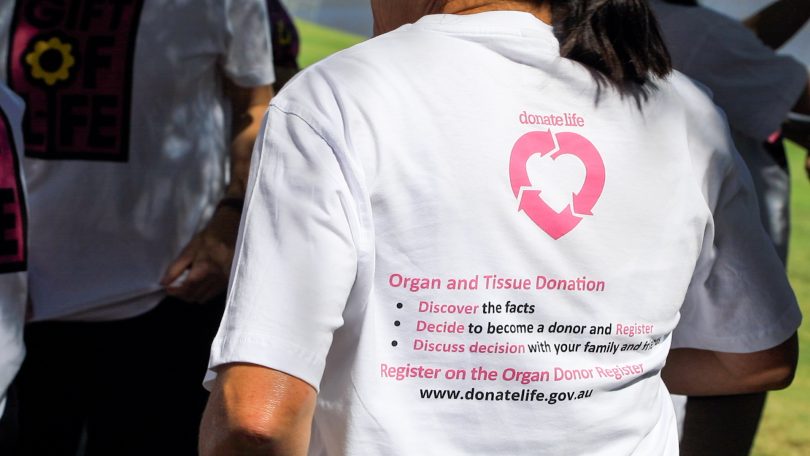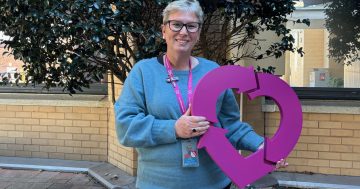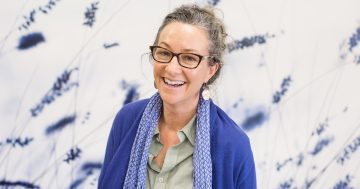
Gift of Life’s DonateLife Walk 2021 will be virtual, prompting important conversations about organ donation. Photo: Michelle Kroll.
I’m one of those people you hear say, ‘I never thought I’d be sitting here telling you this, but have the conversation about organ donation.’
As a family faced with the decision about organ donation, I guess we were more fortunate than others. We were not faced with a traumatic accident or something unforeseen. My brother had a brain tumour and we had time. But we knew he was not going to be with us much longer.
When Robert was in his final stages and being cared for at Canberra’s Clare Holland House, I got to thinking about the people in his life with who he may perhaps have lost contact, but would possibly like to know what was happening with him.
One of those people was Professor David Mackey, a Perth-based authority on Leber Hereditary Optic Neuropathy (LHON), a rare genetic eye condition that causes blindness. Robert carried this defective gene and became blind at age 38.
Professor Mackey was instrumental in helping Robert through the early years of his condition.
LHON is a mitochondrial disorder where the visual messages don’t transmit at the back of the eye to the brain. Research is being conducted around the world to determine the reasons why the messages are not transmitted, but being a rare condition, LHON, like many other little-known conditions, does not get the research funding like the health conditions we all hear much more about.
LHON affects more males than females carrying the gene and typically occurs at a younger age. In Robert’s case, which was fairly typical, the sight of one eye went very quickly – over one weekend – and the other eye during the next few months. He still retained some peripheral vison, but the loss of sight was traumatic and devastating for him.
In tracking down Professor Mackey, I also learned about the research that Isabel Lopez is undertaking into the prevention of blindness from LHON at the Centre for Eye Research Australia (CERA).
During my discussions with her, I discovered the need for material with which they could research the condition. Ideally they could use tissue, but needed more.
Robert was in his final stages so the family discussed what we could do. It was decided his eyes would be donated to CERA for research into LHON, with assistance from DonateLife Canberra and the Lions Eye Donation Service, which provides tissue for corneal donation.
The decision was not one of pain for us. Robert had endured enough of that throughout his 26 years suffering from LHON. This decision was of hope – for others and for the future. It was also about pride. That Robert’s misfortune would be able to help others. And of that we knew he would be so proud.
We lost Robert in early January 2019. His eyes were transported to Melbourne just a few hours after his passing. His eye donation was so significant because it is only the second time in the world that the eyes from a deceased LHON patient have been donated for research. The other donation was in Italy.
This was like gold for scientific research. Researchers in Singapore, Cambridge, UK, and Melbourne worked together to determine a collaborative approach to best use his eyes to learn about this rare, insidious disease, and also how to treat it and prevent it.
Closer to home, all of us in the family line are impacted by this genetic disease. As Robert’s nieces and nephews are having their own children, this donation could have a huge impact on them one day.
I urge everyone to have an open conversation with their family about organ and tissue donation, but also donation for scientific research. Eye banks, and many other organisations that accept donor organs and tissues, will always try to facilitate donations for research.
However, if your family wishes to donate for a specific disease or condition, the best approach is to directly contact a research institute such as the Centre for Eye Research Australia. They will be able to link you with a scientist who specialises in that disease and ensure the donation is put to good use.
Age is no barrier for this. Robert’s contribution will assist others in this situation in Australia and all over the world for generations to come. He always wanted to travel overseas and never got to do so, but without him realising, his world just got enormously bigger.
Have the conversation. Organ donation saves lives, but also helps with research.
Be part of the virtual Gift of Life DonateLife Walk 2021 this week and help promote conversations about organ and tissue donation. Gather your friends, family or colleagues and walk up to 5km during the week of 22-28 February. For more information, click here.
Find out more about the Centre for Eye Research Australia’s LHON research here.
The Lions Eye Donation Service in Melbourne works closely with CERA researchers and can be contacted here.














